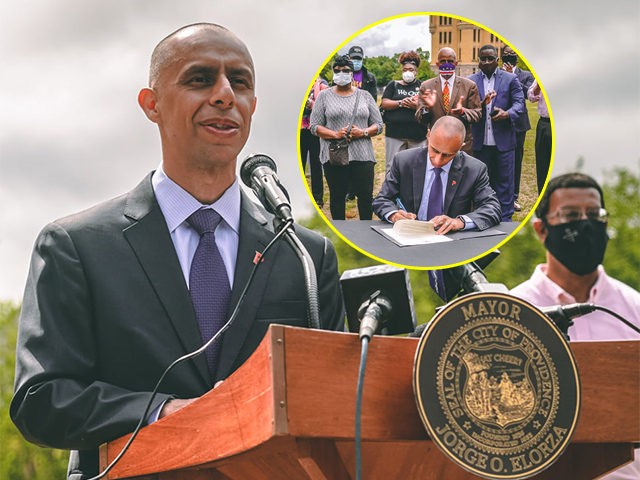Providence, Rhode Island, Mayor Jorge Elorza (D) on Wednesday signed an executive order to pursue a “reparations process” for African-Africans and indigenous people.
The Providence Journal notes:
The process in Providence, Elorza said, will start with members of his administration and a group of African-American advisers meeting with historical societies and researchers to come up with a plan for sharing the state’s role throughout history in the institution of slavery, genocide of Indigenous people, forced assimilation and seizure of land. The history could be shared through methods such as exhibitions, community conversations and guest speakers, he said.
City leaders will also review local and state laws as part of this process, particularly those that result in discrimination against Black and Indigenous people in the public and private sectors, according to the city.
“Today’s announcement is a commitment that we’re making to a process,” Elorza said in a press conference. “What we’re doing here together is truly something historic… but most importantly, it comes directly from the voice of our Black community.”
Despite Elorza’s enthusiasm, not all local leaders believe reparations is the best method to increase opportunity within minority communities.
Mike Stenhouse, founder of the Rhode Island Center for Freedom and Prosperity, issued a statement saying that school choice, not reparations, should be the focus of helping people of color.
“While acknowledging that the liberal-left agenda has failed black and minority communities in contemporary times… by forcing their children to attend failed schools and by enacting policies that make it easy to become dependent on the government… it would be an unprecedented and immoral act of government to seek reparations – even for the horrible wrongs that were committed generations ago,” said Stenhouse.
The development comes one day after Asheville, NC, City Council voted 7-0 to approve reparations for black residents. The resolution will not result in direct payments to individuals but will mandate investments in poorer black communities.
“Hundreds of years of black blood spilled that basically fills the cup we drink from today,” Keith Young, a black member of the council, said of the vote. “It is simply not enough to remove statutes. Black people in this country are dealing with issues that are systemic in nature.”
Meanwhile, Congressional Democrats continue to push Rep. Sheila Jackson Lee’s (D-TX) Commission to Study and Develop Reparation Proposals for African-Americans Act. The bill is part of the “Biden-Sanders Unity Task Force” platform.
“Democrats commit to the important first step of supporting H.R. 40, which would establish a commission to examine how the legacy of 246 years of slavery and another century of Jim Crow segregation continues to impact the economic prospects of Black Americans today, and to recommend remedies,” the plan states.

COMMENTS
Please let us know if you're having issues with commenting.